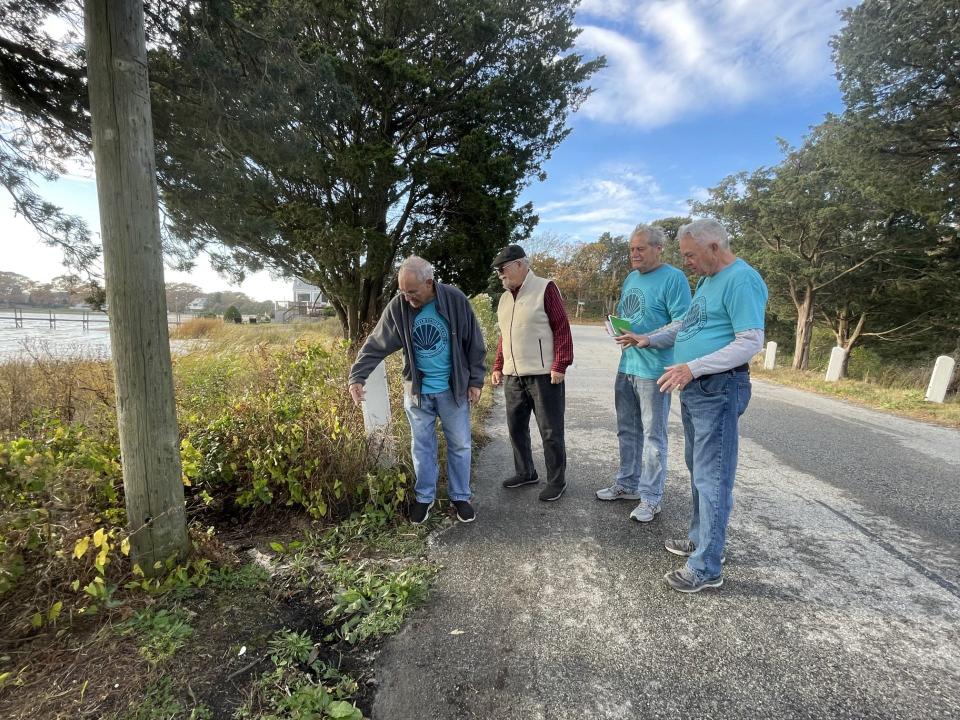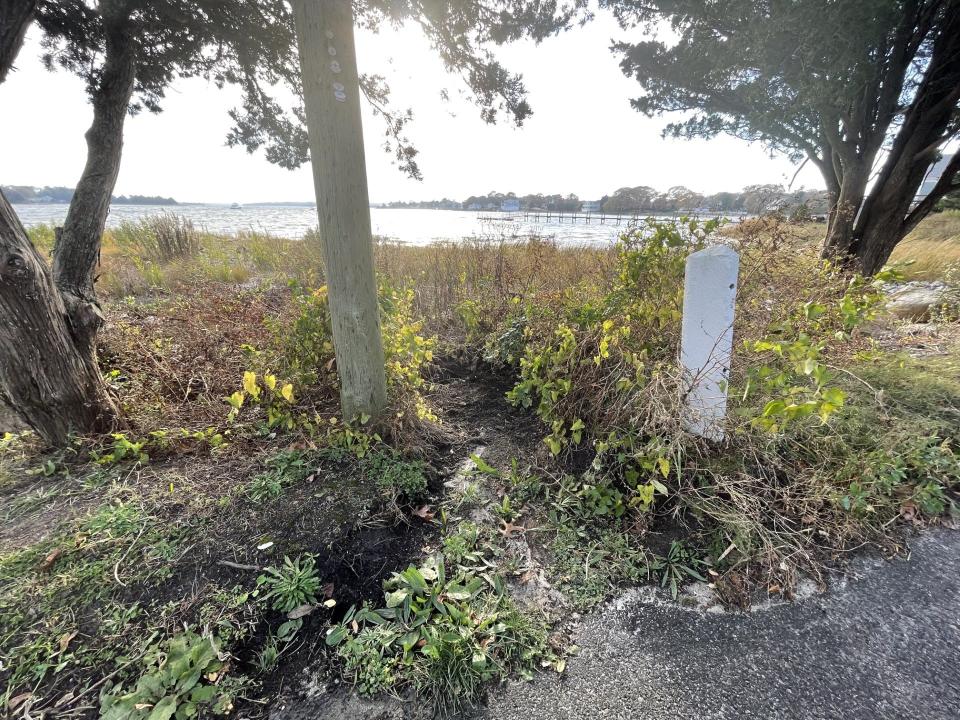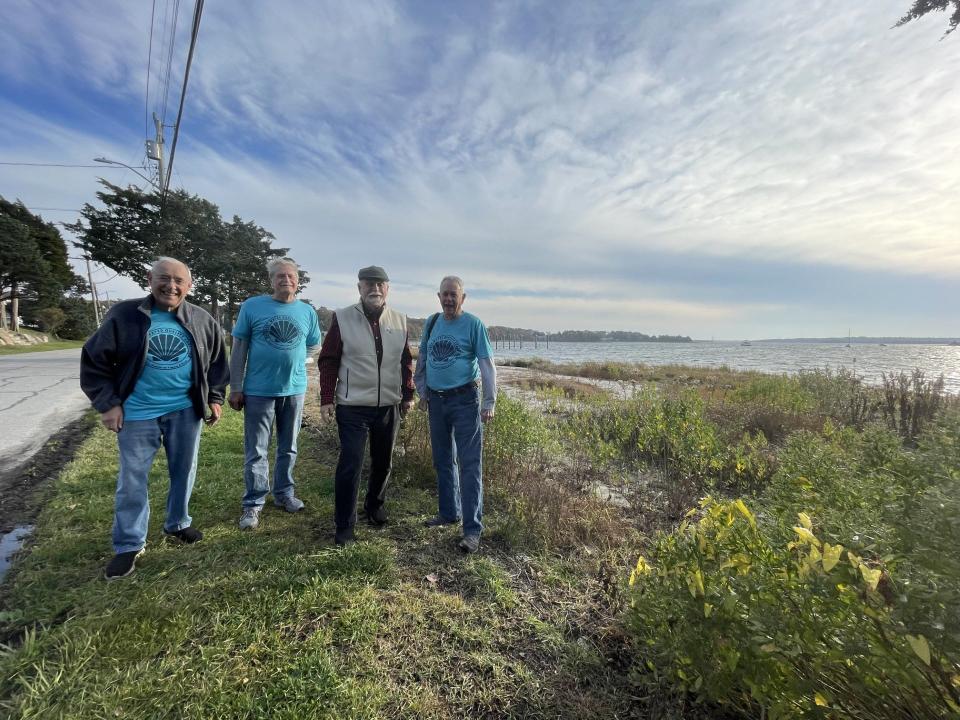'Ankles in black mud.' Can rain gardens restore Hen Cove? This group thinks it's a start.
POCASSET — When Frank Gasson was a boy spending time on the shores of Hen Cove, a pocket of water between Pocasset and Red Brook harbors off the east side of Buzzards Bay, he often proudly brought home messes of scallops and blue crabs for his mother to cook.
The 84-year-old also recalls the wonder of swimming with the bivalves fluttering in their shells near the surface, like underwater butterflies — something that fellow Hen Cove resident Bob Dwyer also remembers, describing how "when you'd put your head underwater, you could hear the clicking, like castanets."
"Nobody scallops here now, because there aren't any," said Gasson, gazing out over the sunlight-dappled cove as he stood with Dwyer, Keith Barber and Jerry Struzik near the water's edge on a recent breezy November day.

Not that anyone could if there were still scallops around. Runoff from septic systems, yards and roadways has degraded the water quality, and the head of the cove is closed to shellfishing.
"Everybody wants to fix this mess we have here," said Dwyer.
There is hope. As leaders of the Pocasset Water Quality Coalition — a nonprofit group, Gasson founded in 2019 in collaboration with people from neighborhoods surrounding Hen Cove, Patuisset Island, and Barlow’s Landing — the four men are leading a project to create rain gardens to help reduce how much pollution gets into the cove.
The coalition recently received a $37,655 watershed implementation grant from the federal Environmental Protection Agency's Southeast New England Program (SNEP) that aims to restore clean water and healthy ecosystems and support sustainable communities.
"We are very proud to be the only group on Cape Cod to receive a SNEP grant this year," said Barber, the coalition's president.
What is a rain garden?
According to the UMass Amherst Extenstion Landscape, Nursery and Urban Forestry Program, rain gardens "are attractive, functional landscaped areas designed to capture and filter stormwater" and "may also be used as a buffer in shoreline areas to capture runoff from the home landscape before it enters a lake, pond, river or estuary."
These gardens, the institution explains on its website, "collect water in natural or constructed shallow vegetated depressions and allow it to soak into the ground slowly. This reduces the potential for erosion and minimizes the amount of pollutants" — fertilizers and pet waste from yards, motor oil and salts from roads and driveways, nitrogen from traditional septic systems and cesspools.
The problem at Hen Cove
The geology of the Hen Cove area, while beautiful, is also problematic when it comes to the movement of water through what is now a densely populated residential area. Hidden under the trees and houses lies the terminal moraine of an Ice Age glacier, where it stopped advancing and, as it melted, dropped the load of sediment it had carried along.
"This is the hilliest part of the Cape, right here, and there are no stormwater controls," said Dwyer, the coalition's vice president, "so, when it rains, this is Niagara Falls."
The nitrogen content in the water, from septic systems and runoff, said Barber, "is bad."
The men said the downward spiral for water quality in the cove began in 1960, when the town created a beach that essentially blocked tidal flushing of water out through Pocasset Harbor, between the mainland and Patuisset Island.

"And it's all gone to hell since then," Barber said.
Over the decades, more of the homes around the cove have become year-round residences, meaning more contamination draining into the cove, Barber explained. The area is surrounded by many older homes with traditional septic systems and several cesspools.
Now, with the concentration of nutrients from unrestrained runoff, Dwyer said the cove "grows algae" that turns the water "pea soup green in the summer," and all of the native eelgrass is dead. The algae sinks to the bottom and decays, creating a layer of smelly muck.
"You go 20 feet out, you're up to your ankles in black mud," said Barber.
What are the plans?
The coalition's vision is to restore the cove to what it once was, which would also benefit Wings Neck Inlet and other nearby bays, the men said.
"It's a wonderful place when you have nice sand on the bottom, with eelgrass growing and scallops swimming," said Dwyer. "We want to get it back to that."
They plan to build three rain gardens, arranged strategically around the cove "so the water would go through the rain gardens and filter slowly into the cove."

Barber said the coalition is working closely with the town of Bourne, which will add more storm drains at the top of the hill — $180,000 is already approved for project engineering.
The group has other partners, too, including Mahoney's Garden Center in East Falmouth, the Aptucxet Garden Club of Bourne, the Environmental Science Department at Upper Cape Regional Technical School, J&J Materials in Cataumet and United Rentals in Pocasset.
The coalition will hire an engineer to help design the gardens, but the members and some of their partners will be the ones doing much of the installation.
Mahoney's Garden Center, said Dwyer, will provide plants for all three gardens. J&J Materials is donating delivery of crushed stone, mulch and topsoil, while horticulture students from Upper Cape Tech and the Aptucxet Garden Club will help with planting and maintenance.
All three rain gardens will be constructed on town property next to the cove.
The group additionally plans to organize workshops to educate people about how they can incorporate rain gardens on their properties.
Basically, "you're building a small wetland ecosystem," said Dwyer, who has one in his backyard.
The coalition is planning a study this winter to determine how big the rain gardens should be based on water flow and runoff. If all goes well, Barber said, "we'll start with the first one in the spring."
"We're not solving the world's problems. It's all just local," said Dwyer — but, at least it's a start.
Heather McCarron covers the environment and climate change. She can be reached at hmccarron@capecodonline.com. Follow her on X: @HMcCarron_CCT
Thanks to our subscribers, who help make this coverage possible. If you are not a subscriber, please consider supporting quality local journalism with a Cape Cod Times subscription. Here are our subscription plans.
This article originally appeared on Cape Cod Times: What are rain gardens, and can they save Hen Cove in Pocasset?

